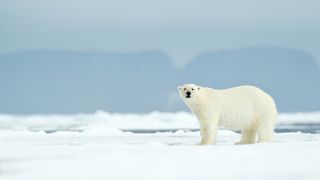- UID
- 20
- Online time
- Hours
- Posts
- Reg time
- 24-8-2017
- Last login
- 1-1-1970
|
|
━━━━━━━━━━━━━━━━━
It's been called the "new Cold War," but what's really going on in the Arctic?

Arctic treasures are spawning a new "Cold War," and the battle to own the Arctic could reshape the region.
(Image: © Shutterstock)
▼ In August, President Donald Trump made international headlines when he voiced an interest in buying Greenland, the world's largest island, which teeters on the edge of the icy Arctic Ocean. As it turns out, Greenland isn't for sale, and Trump was widely ridiculed for his diplomatic blundering. Yet, many wondered what could be behind this unprecedented move —and if it might have something to do with the United State's growing interest in owning a slice of the Arctic.
The U.S. is one of eight nations surrounding the Arctic — along with Canada, Denmark, Finland, Iceland, Norway, Russia and Sweden — that are all currently jostling for ownership of the region's frozen seas. Several of the countries have already submitted formal papers to a United Nations body, claiming portions of the vast Arctic seabed. Climate change is also opening up the Arctic's formerly ice-locked waters, making the region more accessible than ever before. "Based on current trends, the predictions of the Arctic being completely ice-free are [that it will happen] around 2040 or 2050," said Richard Powell, a polar geographer at the Scott Polar Research Institute at the University of Cambridge in the United Kingdom.
This surge of interest in the region has been dubbed the "scramble for the Arctic," or more sensationally, "the new Cold War," because Russia and the United States are big players. But despite the opportunities the region presents, can the Arctic Ocean really be owned by anybody? And why do so many countries want a stake in this landscape of drifting icebergs and polar bears?
There's a straightforward answer to the second question: The Arctic possesses massive oil and gas reserves. The seabed beneath the Arctic Ocean houses an estimated 90 billion barrels of oil — about 13% of the world's undiscovered oil reserves — and an estimated 30% of the planet's untapped natural gas, according to the U.S. Energy Information Administration.
A century ago, this immense mineral wealth would have been unreachable, because (▪ ▪ ▪)
► Please, continue reading this article here: Source |
|